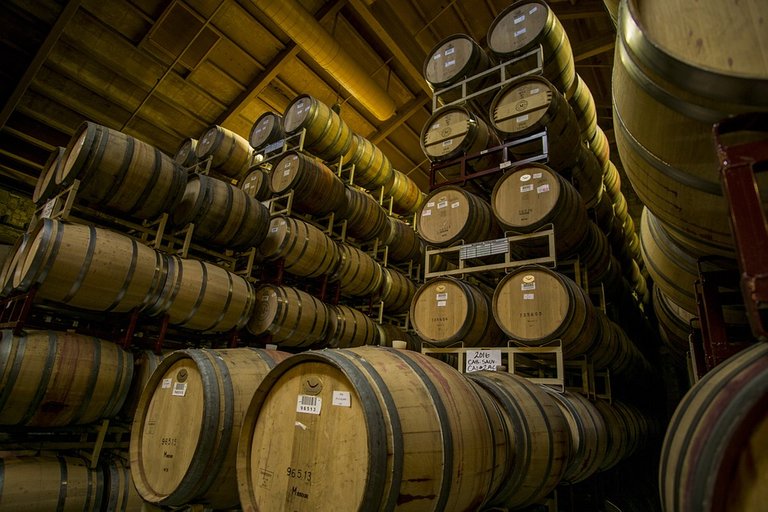
I’m going to assume that most of you already heard the term “fermentation”, often in connection with food that’s supposed to bring health benefits.
After all the medical posts by me recently, I chose to not talk about possible (or impossible) health benefits but wanted to focus more on the question what fermentation is and where we encounter it.
A friend recently asked me what fermentation is and why microorganisms do it. Surely, the yeast doesn’t produce alcohol just for us humans to enjoy as beer or wine? There has to be a reason for it, a reason different than just because, lol.@suesa
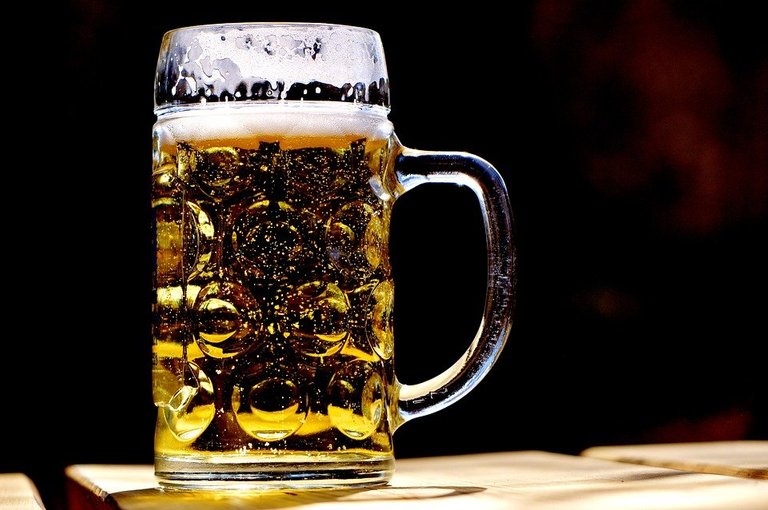
Cells need energy to survive. They like to use glucose to get that energy, as it’s a simple sugar molecule that’s easily broken down. Most microorganisms we encounter (and our own cells) need oxygen for that breakdown process. The pathway is a bit complex and I won’t try to explain it in detail, as it would make the post way too long and possibly boring. But the basic order of processes is glycolysis, oxidative decarboxylation, the citrate cycle and a final oxidation.
If there’s no oxygen, the chain is interrupted after the glycolysis. That sucks for the cell, as it usually needs the other steps too to keep a steady balance of NAD+/NADH, a crucial molecule in cellular processes. To ensure this, there are steps added after the glycolysis that don’t depend on oxygen.
And then you have … fermentation, an alternative way of breaking down glucose, to ensure that the cell can survive even under less than ideal conditions.
I already mentioned yeast, which produces ethanol (alcohol) and CO2 if kept under low oxygen conditions. The problem is, that ethanol is toxic to yeast cells and at a certain percentage, they die off. That explains why drinks with a high alcohol percentage need to be distilled.
Directly connected to the production of beer and wine is the production of bread, at least if it’s done in the traditional way and not with baking powder. Yeast in the dough ferments the flour which creates CO2 bubbles.
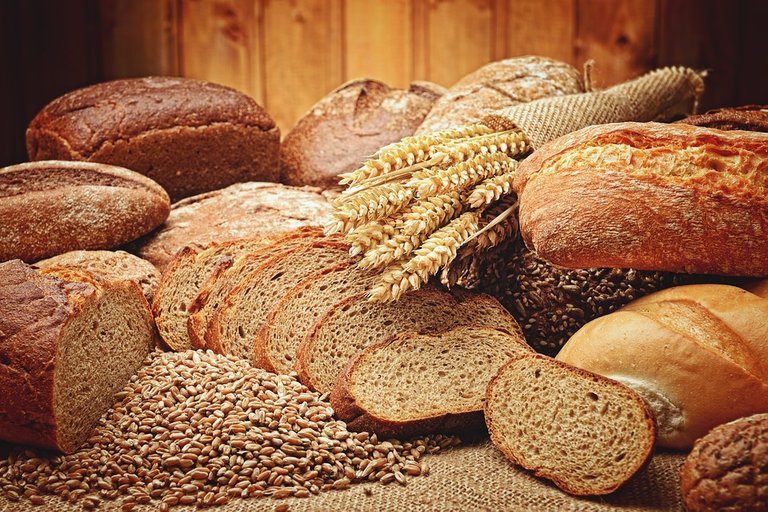
The whole process doesn’t just fluff up the dough but also causes structural changes and the development of the typical “bread” taste (to learn more about bread making, check out @apsu ) For this to work, the yeast needs a certain temperature, about 30°C to 40°C, so don’t keep your dough too cold or too hot while it rises!
One fermented food you likely encounter daily is chocolate. Yes, chocolate is fermented!
When the cocoa beans have been picked, their pulp is fermented for 7 days at up to 50°C, which kills the beans and creates a specific flavor. If done wrong or too long, the beans go bad because of unwanted bacteria (remember, they need yeast and bacteria to ferment the beans) and fungi.
So, who do we have to thank for chocolate and beer? Microorganisms!
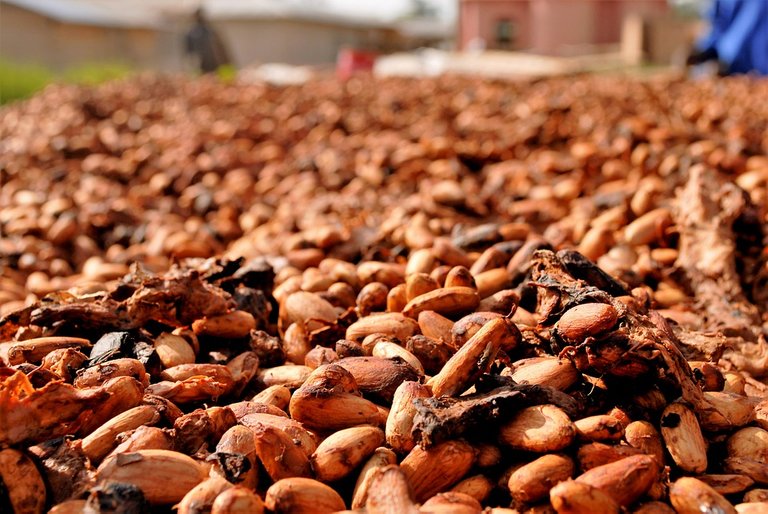
Fermented food is commonly found in all parts of Asia. One example would be fermented fish, which is common in the Philippines. They typically have two groups of fermented fish, those with a high salt concentration (up to 20%) and those that are sour when they’re done.
The sour fish isn’t the only case where fermentation and acid production come hand in hand. Salami is a fermented sausage and if produced in the USA, the fermentation process usually happens fast and at 40°C, which causes the PH to rise drastically. Compared to European Salami, the taste is a lot different. If you ever compared the two and wondered what the hell happened, you now know why.
European salami is fermented at comparably low temperatures of 22°C to 26°C. Instead of having a high concentration of acid (which is supposed to kill off unwanted bacteria), the sausage is dried to keep it from spoiling. This creates a completely different flavor.
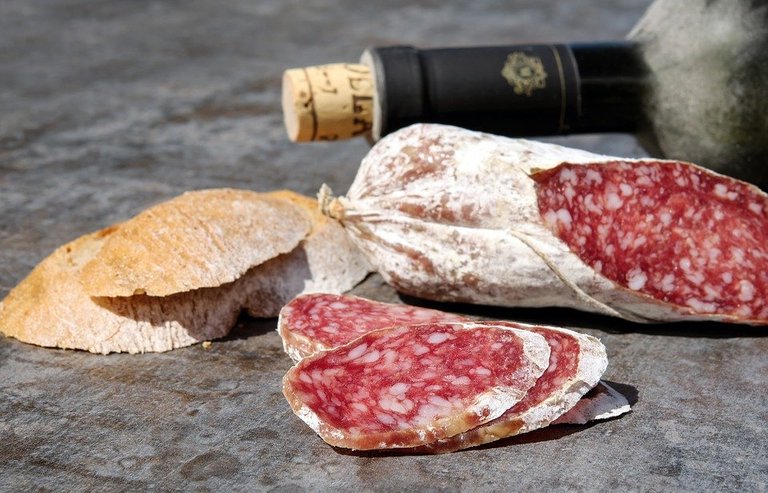
After possibly ruining several foods for you, because you just realized that you’re basically eating microorganism poop (or maybe this is the point you noticed it, in that case, I’m so not sorry), let me give you one last example where fermentation happens:
In your own body!
Your muscle cells need oxygen, but if they don’t get enough of it, they do something called “lactic acid fermentation”. The end product of that is lactate. Some say that’s the reason for sore muscles after you’ve exercised hard, but there are voices against it. One more thing people constantly fight about.
I’ll end my post with a fun sentence the owner of a local, vegan restaurant once said:
This paste is made out of cashews, fermented by vegan bacteria!
If anyone can tell me what exactly makes bacteria vegan, I’ll be very impressed.
Do they only eat plants? Can you put them on a piece of meat and they die off?
Who knows?
He didn’t.
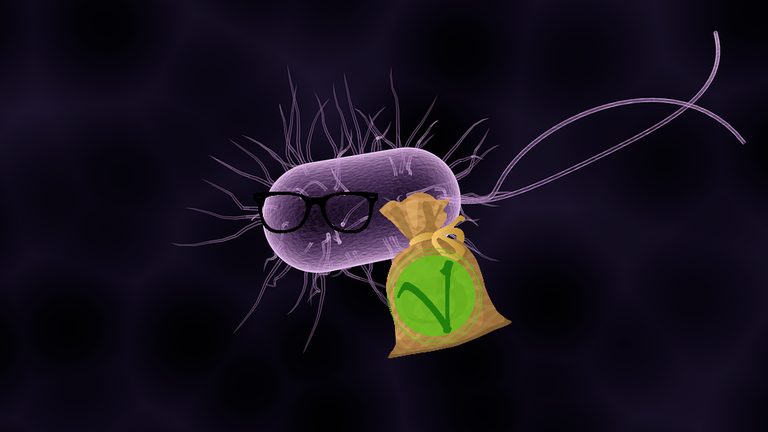
Sources:
Fermentation and anaerobic respiration
The microbiology of cocoa fermentation and its role in chocolate quality
Fermented Fish Products in the Philippines
Picture taken from pixabay.com, the “vegan bacteria” is my edit.
--
My mentee this week is @xhodan ! This time, not a scientist but a fiction writer. Have a look at his content!

Time to pour a cold one
I can give you an explanation on the vegan bacteria.
As we know, we can find bacteria almost anywhere. Different kinds of bacteria can be found on in different conditions and places, even in exotic places like toilets and our skin.
I know bacteria and yeast are two different things. However even when creating a sourdough, I can use the wild yeast living in the flour OR I can use different kinds of fruit which can contain wild yeast on them. Typically I'm using organic, shredded apple to speed up the birth of the sourdough.
It's just a similar process with bacteria. If you want to pick up a vegan bacteria, just find a vegan and get some bacteria out of him. You can either swab the vegan OR you can shred them.
One somewhat popular method is to use gut bacteria of the vegan. Just put your rubber gloves on and start collecting some bacteria for the perfect vegan fermentation.
You got me, haha. I was totally expecting an actual explanation.
Making fun of vegans will always get a laugh from me. It's not that I envy their ability to, at the expense of their own material pleasure, make the clearly correct conclusion on what manners of human sustenance are morally defensible... nor that belittling them makes me feel better about my everyday, ongoing decision to participate in what essentially amounts to mass genocide of cute and furry things with feelings and families. It's just that I don't respect them. :)
My gift is not the ability to educate people, but instead the skill of making jokes of anything.
Don't forget the microbes in the air! And actually, there's bacteria in your sourdough too. It's probably vegan, unless there's butter in the dough. I suppose it might be possible to raise bacteria on a non-vegan diet and then use them to ferment cashews... but that's a stretch.
That would be the ultimate evil. Grow non-vegan bacteria and create "vegan" "cheese" with them to trick vegans to eating something secretly non-vegan.
This is all about biology... and the beer picture makes me think about physics (double phase thermodynamics to be precise :p).
I am impressed... This possibly beats the story with a cheese factory I visited in Quebec, where the cheese where getting mature in plastic bags. I told the guy about the cheese caves existing in Europe (with the fungi stuff and so on), and he looked shocked. He then ensures me that all cheeses made by his factory were bacteria-free. Yeah sure, the guy knew what he was talking about... :D
Hahaha!
Funny that you mention vegan bacteria! My prof was recently talking about flesh-eating bacteria and on the slide had this comic...
mark parisi(
If you asked the parents, they'd say it's a phase. She calls it a lifestyle choice.
I love this :D
I have to say that I’m really impressed with how far your writing has come along. Not that it was ever bad. It’s just really good now.
Way to go suesa!
Always room for improvement! :D
This post is trending at Google for US, UK, NZ, FR,PK and many other including China for this term 'Fermentation Steemit':

Excellent post @suesa. You're sounding more like my school teacher with every science post you write. :)
Steem On!
I'm not sure if that's a compliment 😂
Of course it is! Sitting at Google's top ranking in all major locations for a certain term is a big achievement. Soon, your posts will be bringing tons of traffic to Steemit.
Was referring to the teacher thing but ok :P
Just going to drop by and drop this off:
I own a bread making machine though. It's just both SO much cheaper and more delicious to be making your own bread. Thing become problematic when you forget the yeast. Bam. thats one big chunk of concrete in your breadmachine.
t.
In my post about milk kefir a while back I chose to word my brief explination of fermentation carefully to not mention the bacteria poop thing, haha. Loving the informative articles :)
Don't omit the truth! People need to know they're eating bacteria poop :D
I never knew fermented foods had this much importance in our daily lives especially yhe part that says chocolate is fermented got me like wow.
Fernemtation from what i know is used in brewries, yeast making and there is this local drink called palm wine from palm tree its usually alcoholic,but its a fermemted product from palm tree. Thanks for the post and steem on suesa.
Awesome post! I've started getting into the world of homebrewing and it was neat getting to see this concept get broken down! Thanks so much—going to follow you for your future posts. Really love it!!!!
Loves me some yeast shit! I mean...beer!
But honestly, without malted barley and yeast metabolism humans would be so boring.
If you want a really good review on the domestication and divergence of brewing yeasts, with a particular focus on beer, check out Dr. Kevin Verstrepen's work; world class genetics research out of Belgium! This paper in particular has been a gold mine of information, with 157 de novo genome sequences and extensive phenotyping for a wide range of yeasts: http://dx.doi.org/10.1016/j.cell.2016.08.020
There's enough information that paper for one to design CRISPR guides and start making changes to brewing yeast metabolism! I'm trying to keep the redox balance (NAD+/NADH pools) stable so those cells stay healthy while trying to develop a non-alcoholic beer by short circuiting ethanol metabolism :)
Cheers!
Ok, apparently i had no idea what is fermentation:) I like the way you explained it in your words, thanks for the article, it was interesting.
Ive been a commercial student all my life and lacked basic scientific and biological knowledge , but i know Ive learnt something here today.
this is really educative, i love it
"This paste is made out of cashews, fermented by vegan bacteria"
I am sure he simply meant that the nutrition consumed by his particular bacteria is of vegan origin :)
Great article, as always!
Excellent!! It's amazing how many foods people DON'T KNOW are fermented outside of things like pickles or wine. Thanks for a well informed, unpretentious post. Cheers with a tasty glass of fermented apple cider :)
Microorganism poop and bee puke
Thank you for this brilliant post - it was fun to read! Microorganism poop has never put me off. Neither has bee puke - or honey, as most people would call it :-)
Fermentation can do even more
Just a few more thoughts: we also use fermenters to produce drugs such as insulin or penicillin - and to produce other substances, which we use on a nearly daily basis such as citric acid or flavouring agents. Also, fermentation is part of sewage treatment and biogas production. Bacteria and fungi are fascinating living beings!
Looking forward to your next post!
#proudtobeabiologist
Interesting, as always. I love beers and I was initially attracted to read on because of that beer photo. Lol. Anyway, thanks for letting me understand what this fermentation is all about.
Dude! This was a great read! Microorganism poop! Ha! I still love kimchi...
New Follow!
I love fermented foods so much that I used to host a fermented foods potluck that I called Cultured Club! It was really a lot of fun.
I mostly make saurkrauts, salsas, and kombucha.
What I always found so interesting about fermeting is that there is a fine line between safely fermented and hazardously rotten. If you get the salt balance wrong, or introduce a contaminant, let too much air in, or have any food material above the level of your brine, you have a big rotten mess as opposed to a delicious fermented health tonic. Ideally, we are creating the perfect environment for the RIGHT organisms to grow, while creating an environment inhospitable to the ones that would make us sick :) Cool food science for sure!
I like your comment, it is really wonderful!
Haha thanks! followed you to see what you are all about!
Always welcome! Nice to have you on board!
Great article @suesa! When I think of fermentation, I'm usually thinking of alcohol. I never new chocolate was fermented, who knew!?! I just followed you, it's the first article of yours I've come across and look forward to more!
I always learn something new from your posts. Never knew chocolates are fermented. Milk yes and I love it with some hot ugali. Beer yes, though I have never really been a fan; maybe some white wine. Question, are they harmful? Lol.
Ethanol is harmful, the bacteria in fermented food might sometimes not be so great for immunocompromised people, but aside from that? You should be fine eating those.
Thank you for clearing that up!
I love this, thank you for the information, something I wondered and just never took the time to research.@suesa
stay blessed :-)
Thanks for the short and sweet explanation of the anaerobic metabolic path—that was a nicely digestible dose of science!
Alcoholic beverages typically brewed with an air lock to keep oxygen out as CO2 bubbles out. Yeast are able to use the process you described to keep turning sugar into alcohol, but the bacteria that produce acids (vinegar) from alcohol are not.
Many fermented foods are produced with oxygen present, like sourdough bread, kombucha (vinegar), and kimchi/sauerkraut. Those all come from a mixed culture of bacteria and yeast.
Another surprisingly common example of fermented food is coffee. Like cacao, the beans are fermented, to a lesser or greater extent depending on processing, before being roasted and consumed. This partly accounts for why coffee has arguably the most complex flavors of any food, if it's not burnt!
Mind blown! I only knew about fermenting through alcohol and crazy Scandinavian food (surströmning anyone?). That chocolate is also fermented calls for a rethinking of my whole world.. what else is not what it appears like? Well written post, thanks for expanding my knowledge :)
There are many pathogenic microorganisms (causing diseases, intoxications and infections), which is why many people consider them harmful. But where to leave those microorganisms beneficial for health? The microorganisms that give us that exquisite knowledge of many cheeses, of many wines, of the majestic beers? Penicillin, an antibiotic basically produced by a fungus (Penicillium), which has the ability to eliminate bacteria that cause infections in the human body? And so many more microorganisms.
Anyway, I went far, in the post it talks about fermentation, but I can not avoid always defend microorganisms (I'm a fan of microorganisms), I think it's because of the lack of knowledge about these ... I'll do a campaign to defend them, hahahahahaha regards.
Totally understand you defending the microorganisms, after all, they're always under attack by people who think they are always bad.
Exactly, you name a bacterium, a fungus or a yeast and people get scared at once. But it is due to the lack of knowledge.
That's what I mean when I say I'm going to campaign. We already know the adverse health agents that microorganisms cause, it is time to highlight the benefits we obtain from them.
Hmmm fermented relatives!! My family is so large!!
all that's right @suesa we have no apparent reason about all this, because other others likes especially about food everyone hair different different, there hair yellow there black hair and there war, I love with all this posting is fabulous @suesa incredible, thank you.
Fermentation is a chemical process in which organic matter is decomposed. I'm a best
For example, fungus or mold, which works on the sugar mixture with mineral salts, produces penicillin.
Beer yeast. Fermentation is also essential in the production of bread, cheese and yoghurt
yo yo
too complex to understand... still think you deserve my upvote
buena explicación sobre la fermentación de los alimentos, y su importancia en la alimentación, también existen fermentaciones anaerobicas, como el caso del proceso del ensilaje de pastos para la alimentación de bovinos.
Really informative post...all the information is really amazing..I learn more from you
Just start to follow you😊
Hi suesa.. Impresive article and infornations.. Thabx dear.. I was a science student but neva read such an amazing article in a different way..
this is just awesome and priceless information. i am going to follow you and hope will learn alot from you.
Its amazing and nice blog. All information is best and awesome for steemian. All the bestHey @suesa
I have worked on a beer factory . The name is "Rodenbach" in Belgium.
In Roeselare in West Flanders, the Rodenbach family founded the brewery in 1836. The beer owes its unique quality and masterful character to the oak foeders in which it ripens. Rodenbach is the typical example of Flemish red brown beers from West Flanders. It was recognized as a regional product and is probably the most awarded beer in the world.
When German talks about beers XDDDD wa ka ka ...
:P
how important it is! especially to have my favorite wine... Barolo! 🍷 cheers!
Fermentation is a magical thing! :).. I make my own beer! Great post! Upvoted!
I knew about beer, alcohol and bread...but chocolate/ that one is new!
Vegetarians (vegans) tend to avoid cheese-based cheese consumption. We have our own way to make cheese safe for vegetarians. Namely, cheese-based nuts.
what are "cheese-based nuts" supposed to be? And "cheese-based cheese"?
cheese-based peanuts. The outer and inner shell peanuts are peeled, then blended. The composition between water and beans is 2: 1. The result will be peanut milk. Peanut milk is filtered, then heated not to boil
with a temperature of 73-75 degrees Celsius for 15 minutes. This is done to kill the bacteria. This is all I know.
But this has absolutely nothing to do with cheese. Calling it "cheese-based" implies that there is, at one point, cheese involved in the process.
It might be "Peanut-based" cheese (although you can't call something cheese if there is no milk in it, at least not in Germany as far as I am aware)
thank you for the impormation. a moment if you know it, please for me.
whats that process called? when the same thing is done using the milk and other bakery products. is that fergmentation too?? curd and butter are created using that process. if not fergmentation, then whats that called?
https://en.wikipedia.org/wiki/Curd
Very interesting! great post :)
Fermentation shouldn't be something one has not heard of. Of course, I know fermentation makes alcohol, and lactic acid in the muscle but in chocolates, am shocked...
Being born in holland I have always known fermented cabbage - zuurkool. But I never realized that bread is actually fermented. Does this make it healthy?
I will eat chocolate anyway I can get it. What is the difference between dark and milk chocolate?
Bread is healthy if not eaten in too large quantities. The fermentation doesn't have much influence on that. Milk chocolate is technically not chocolate, as it only contains the cocoa bean's fat, not the cocoa itself! :)
Lol. As an amateur microbiologist, the bacteria and generally microorganisms are of immense help in the food industries,breweries and even in the human body. For example, streptococci can produce can produce so much lactic acid and other organic acids from sugar fermentation. Many people actually only believed microorganisms has to do with infections and diseases
I make a coconut yogurt that needs to ferment for 2 days to reach the right consistency. The only problem is that sometimes it ferments correctly and sometimes it doesn't! I can not for the life of me figure out why and it's frustrating! I live in Florida so sometimes I think it has to do with the weather but it's worked perfectly fine on cold AND hot days so I'm confused lol. Any tips?
Check if there's possible contamination. One wrong strain of bacteria can pretty much ruin any fermentation. I'd say look at your yogurt under a microscope but I doubt you have one, so just make sure everything is clean and nothing that isn't supposed to be in there falls into your yogurt.
Thank you so much! I didn't think about that... I will definitely be more cautious to possible contamination next time!
Awesome information....some of the tastiest creations like wine, beer, salami etc. go through a process of fermentation...wow, who would have thought???

Good educational information should be shared so your post has been Upvoted and Resteemed. Hope more people get to read your blog.
entre mas fermentada ,,mucho mejor ,,digo la cerveza jajaj saludos.. excelente